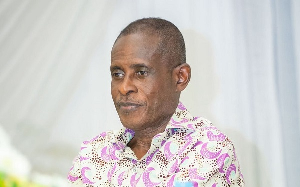From: Joe Kingsley Eyiah, Toronto-Canada
Ghana faces a problem of management and implementation. Inquiry reports are left unattended to. This revelation was made by the Most Rev. Prof. Emmanuel K. Asante who is the Chairman of the National Peace Council (NPC) during his interaction with Ghanaians living in Toronto, Canada on May 11, 2013. However, Prof. Asante added that the management of problems can best be enhanced through capacity building and, remarked, “In Ghana, the National Architecture for peace under pins the government’s efforts to promote stability throughout the country. The architectural design of the National Peace Council (NPC) emphasizes the government’s paradigm shift from a ‘law and order’ based approach to conflict management and peace building to an approach that seeks more participatory and durable solutions to issues of violent conflict within the various regions and districts.”
Before NPC was established by law in November 2011, Ghana has been using a mix of methods in managing conflicts. For example, according to Prof. Asante, “Apart from the deployment of law enforcement and security personnel to enforce peace and order in the event of violent conflict and the institution of commission of enquiries to ascertain causes and proffer solutions to prevent future reoccurrence of the violent conflict, indigenous mechanisms for conflict resolution such as traditional authorizes, the clergy and respected individuals within a particular community have also been utilized.”
These traditional and indigenous mechanisms for managing conflicts work well since they reflect the culture of the people and give the parties involved ownership of the resolution process. However, such mechanisms need to be enhanced through the capacity building of the personnel involved!
The discovery of oil in Ghana has not only made the country popular but has also helped the country to attain a status of a lower middle-income economy. Prof. Asante therefore opined that “from the socio-economic and political perspectives things are showing up for Ghana”
With such high expectations, Ghana faces management challenges. Prof. Emmanuel K. Asante numerated among the key challenges the following:
-Political exclusiveness which results from the ‘winner-takes-all’ syndrome that polarizes our country along party and ethnic lines.
-The problem of poverty, high rate of illiteracy and sharp inequalities between the nort and the south.
-The apparent weaknesses of the electoral system as exposed by recent election leading to a court action between our two main political parties in the country-NDC and NPP
-The problem of the land tenure system informed by the Chieftaincy institutions.
-Freedom of expression and the problem of the growing irresponsibility and unprofessionalism in journalistic practices in the country; and last but not the least,
-The challenge posed by the seeking of justice without compromising peace and vice-versa!
Opinions of Tuesday, 4 June 2013
Columnist: Eyiah, Joe Kingsley
Ghana Has Problem of Management and Implementation
Opinions













